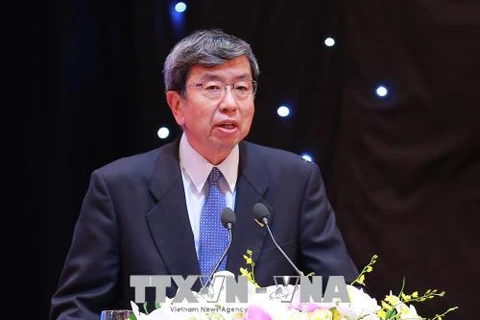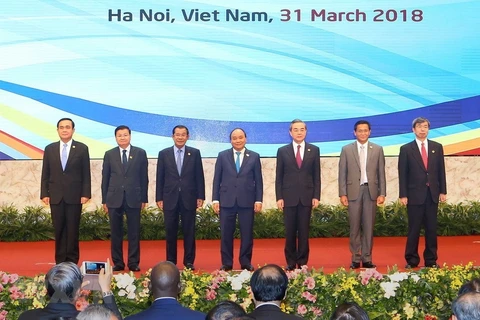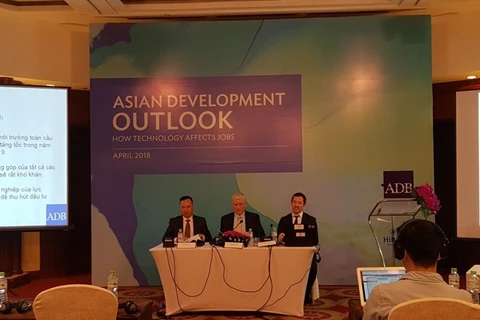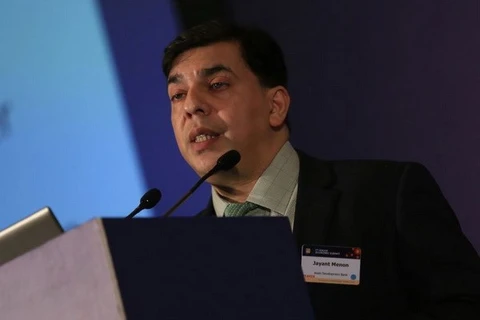Hanoi (VNS/VNA) - Vietnam is persuading international financial institutions, including the Asian Development Bank (ADB), to expand their funding for the local private sector and reduce government guarantees for those activities, since Vietnam will graduate from concessional assistance by ADB in January 2019 due to becoming a middle-income economy.
Deputy Governor of the State Bank of Vietnam (SBV) Dao Minh Tu speaks to Vietnam News Agency's English-language newspaper Viet Nam News about these issues on the sideline of the recent ADB 51st Annual Meeting in Manila, the Philippines.
Question: What has Vietnam achieved in the ADB’s 51th Annual Meeting?
Answer: The meeting aimed to strengthen the bond between member countries and expand ADB’s main activities in the context of global financial volatility and various changes in economies’ trade policies. On behalf of the Vietnamese Government, we were able to deliver messages to the audience addressing the country’s current socio-economic development and status in the international community. We noticed that ADB officials and partners have spoken highly of Vietnam’s position in both the regional and international community as the Government has made strong economic growth, poverty reduction, maintained stable political conditions, and employed efficient use of foreign capital.
ADB also wanted to improve its operations in regional countries, especially Vietnam as we are considered one of ADB’s major partners. On the opposite side, the Vietnamese Government sees ADB as an important partner, and desires to improve its relationship with the bank. Activities that Vietnam would like ADB to pay more attention to include technical assistance and policy advice, which are among the bank’s top concerns in member countries and developing economies.
However, as Vietnam has become a middle-income economy, the Government wont be able to receive low-interest loans from international financial institutions, including ADB. For example, Vietnam stopped being funded by concessional lending from the World Bank on July 1, 2017 and it will stop being funded by concessional lending from ADB in 2019. Therefore, the coming two-year period is an important one in which Vietnam has to take advantage of the loans that it has signed with ADB, and that requires the country’s government agencies to take insights from existing and potential projects so that they can be conducted efficiently.
Question: What will the Government do to meet high demand of funding for its development projects in the future?
Answer: There is the remaining 613 million USD that ADB is planning to fund development projects in Vietnam. That will focus on five or six projects in healthcare, education, vocational training, finance-banking, infrastructure development, and private sector development. The two sides are in talks to finalise the plans so that they can be implemented within 2018.
We also had discussions with ADB on extending some loans which are due in the near future, possibly to 2022 or 2023. That will offload some burdens for the State budget as the Government can then spend more on implementing its development projects.
We also asked ADB to pay more attention to Vietnam’s private sector by making more loans to private businesses, limiting Government guarantees for the businesses that want to borrow from the bank, improving the efficient use of capital, assuring the limit of public debt and the economy’s financial security. The suggestion was made as the Vietnamese Government is confident that local private firms are capable of making the best use of ADB’s funding, and they will reduce the risk coefficient that ADB often concerns when implementing development projects in member countries.
The Government must make careful assessment of its possible ODA loans to see if their projects would be implemented efficiently, then they would officially decide to take loans from ADB.
Question: What should Vietnamese private firms prepare in order to get access to ADB funding?
Answer: The State Bank of Vietnam and local commercial banks always accompany private businesses. Some Vietnamese banks attended the meeting and participated in professional meetings and seminars. They will become the bridge to connect ADB and Vietnamese private companies. On their side, Vietnamese private firms needs to do careful calculations to maximise the use of ADB funding. They may get confused in the first place when working to meet ADB standards, but local banks will support and consult them to work with the bank and implement business projects.
For example, when implementing a large-scale development project, ADB will provide funding for the early stage of the development. When the project is properly functional and generates profit, local commercial banks will buy the loan from ADB and replace them to claim the funding. That would help the project to be implemented quickly without being delayed or cancelled while its risks would remain low as it is being effectively carried out and is profitable. This will become necessary as Vietnam needs huge capital to invest in infrastructure development while it lacks the financial capacity to fund those projects on its own.
Question: What has Vietnam done to help ADB and local businesses connect with each other?
Answer: Until now, the International Finance Corporation (IFC) under the World Bank (WB) has done well in lending to Vietnamese private companies. For IFC’s funding in Vietnam, it is local enterprises, not the Government, that need to take accountability for their borrowings. They have to think carefully and do tight calculations for the projects.
ADB has shown its interest in expanding activities in this segment. It would force the Vietnamese Government, its agencies and SBV to continue reviewing existing projects to make sure capital borrowed from international financial institutions, including ADB, is used efficiently and safely.
For the finance-banking sector, the Credit Information Centre (CIC) of SBV is providing local businesses’ information and data to both domestic and foreign investors so that they can rely on the SBV data to do corporate assessments. On the other hand, the CIC can buy business information and data from foreign providers for local commercial banks so that it will become an important sharing channel for both Vietnamese and foreign financial institutions and companies.-VNS/VNA
























